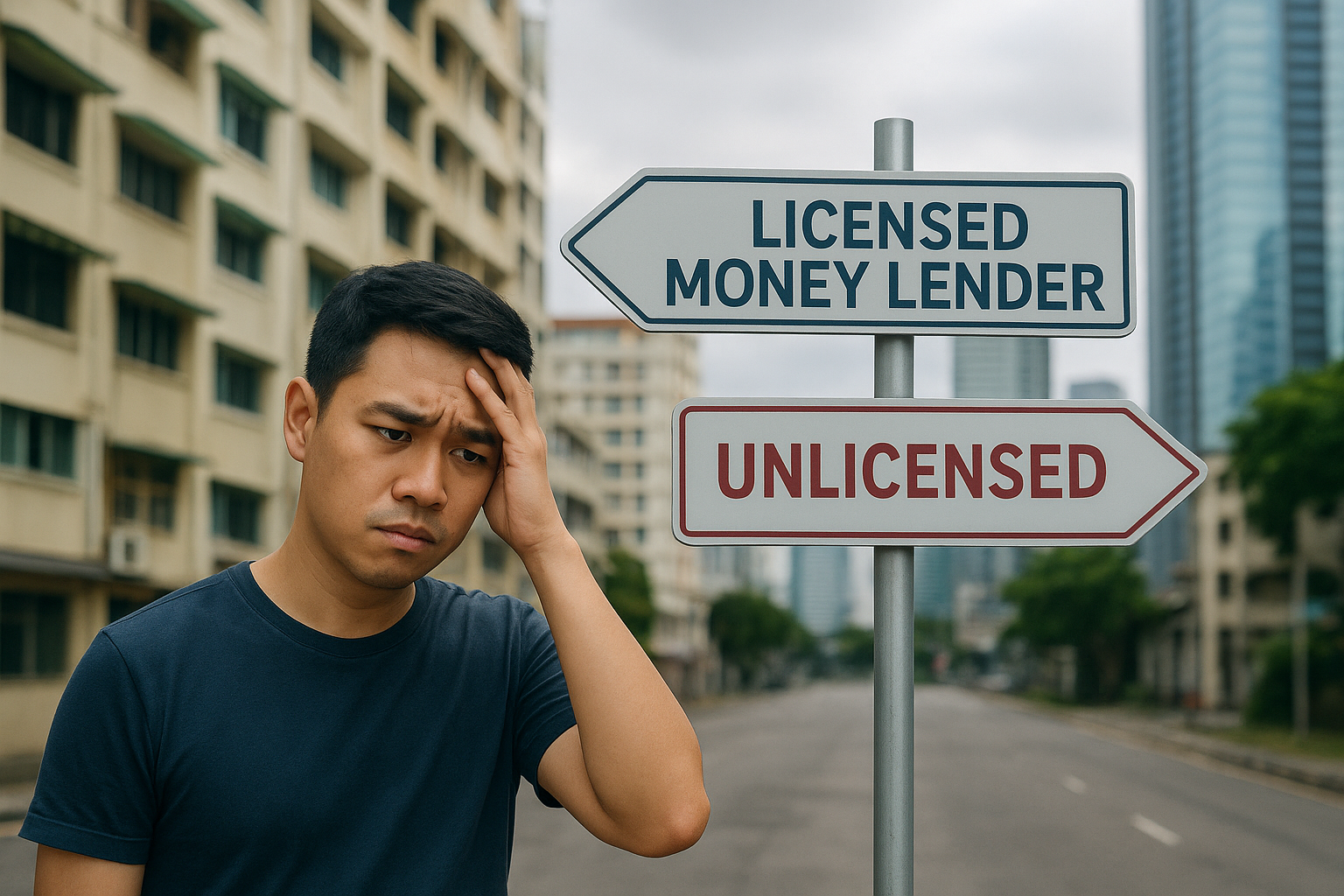While a loan may seem like a quick fix for urgent financial needs, it is crucial to exercise extreme caution when seeking financing in Singapore. The biggest threat to your financial and personal well-being is the pervasive risk of unlicensed moneylender operations. These entities, often referred to as illegal moneylenders in Singapore, thrive on deception and prey on vulnerable borrowers.
Understanding the severe consequences of borrowing from unlicensed moneylenders is the first step to protection; if you ever encounter them, knowing how to report unlicensed moneylender activity is essential to stopping the cycle of illegal and harmful unlicensed moneylending.
Understanding Unlicensed Moneylending
The term “unlicensed moneylenders” specifically refers to individuals or entities that engage in the practice of lending money without obtaining the required legal authorisation or licences.
This critical distinction highlights the significant differences between legal moneylending practices, which are regulated and monitored by authorities, and illegal moneylending practices, which can lead to various risks and potential legal consequences for both the lender and the borrower involved.
Risks of Borrowing from Unlicensed Moneylenders
#1 Predatory Lending Practices and Extreme Interest Rates
Unlicensed moneylenders are not bound by Singapore’s Moneylenders Act, which caps licensed moneylender interest rates and fees. This lack of regulation leads directly to predatory lending practices:
- Excessive Interest Rates: They charge illegally high, often hidden, interest rates that can rapidly multiply the principal debt. While licensed lenders are capped at a maximum effective interest rate (EIR) of 4% per month, unlicensed moneylenders may demand rates that far exceed this, often on a daily or weekly basis.
- Hidden Fees and Charges: Illegal moneylenders in Singapore frequently impose exorbitant and undisclosed administrative fees and penalties, often deducting these amounts before the loan is even disbursed.
- Vague or Non-Existent Contracts: Loan terms are often deliberately confusing, incomplete, or non-existent, making it impossible for the borrower to track the true amount owed or dispute excessive charges.
#2 The Cycle of Debt: Quick Cash Loans
The easy access to fast, quick cash loans from unlicensed moneylenders is a dangerous trap that leads directly to a cycle of debt:
- Small Initial Loan: The process seems easy: a small loan is instantly approved with minimal paperwork.
- Rapid Escalation: Due to the extreme interest rates and opaque fees, the manageable debt quickly spirals out of control. Borrowers find that their monthly repayments barely cover the interest, and the principal remains untouched.
- Borrowing to Repay: To avoid unlicensed moneylender harassment or simply to make the monthly payment, the borrower is often forced to take a second loan from the same lender (or a different one), deepening the commitment to the illegal network and ensuring they remain in debt for a longer period of time.
#3 Severe Consequences and Harassment
Unlike legal debt that is handled through civil courts, illegal loans are enforced through criminal methods:
- Harassment and Intimidation: Borrowers and their family members face relentless psychological stress, including threatening calls, vandalism (splashing paint, writing on walls), and public humiliation to pressure repayment.
- Criminal Offences: Victims of harassment may feel compelled to commit crimes (like debt collection harassment) themselves, while the lenders commit severe offences under Singaporean law.
- No Legal Recourse: As the transaction is illegal, the borrower has no legal protection or recourse against the lender, leaving them vulnerable to escalating demands.
Identifying Unlicensed Moneylenders
- High-Pressure Tactics: Illegal moneylenders in Singapore often use aggressive sales techniques to pressure borrowers into making quick decisions.
- Lack of Licensing: Legitimate lenders are licensed by the Registry of Moneylenders. If a lender is not licensed, they are likely operating illegally.
- Exorbitant Interest Rates: Be wary of lenders who charge excessively high interest rates that far exceed the legal limits.
- No Written Agreement: Reputable lenders provide a clear, written contract. If a lender does not offer this, it’s a red flag.
- Unclear Terms: If the terms of the loan are vague or confusing, it’s a sign that the lender may be trying to take advantage of you.
- Pressure to Borrow More: Illegal moneylenders in Singapore may encourage you to take out larger loans than you need, leading to unmanageable debt.
- Threatening Behaviour: Be cautious of lenders who resort to intimidation or threats when collecting debts.
- Lack of Transparency: Legitimate lenders are upfront about fees and charges. If a lender is secretive about costs, it’s best to steer clear.
How to Protect Yourself from Unlicensed Moneylenders
In Singapore, seeking a loan requires caution. The crucial first step for any borrower is to research and verify that the lending institution is legitimate. Borrowing from unlicensed moneylenders (commonly known as loan sharks or Ah Long) is a perilous decision that can lead to severe financial distress and criminal harassment.
The Critical Verification Step
The only way to confirm a lender is not an illegal moneylender in Singapore but is instead legal and regulated is to check the official source:
- Consult the Ministry of Law’s Registry: You must verify the moneylender’s licence by checking the list of licensed lenders in Singapore on the official Registry of Moneylenders website (a .gov.sg domain). If a lender is not on this list, they are operating illegally.
- Verify the Details: The official list also indicates the approved physical location(s) of business. Licensed lenders are required to meet you in person at this approved location to conduct identity verification before granting any loan.
How to Report Unlicensed Moneylenders
Reporting an unlicensed moneylender is crucial to protect yourself and others from illegal lending practices. Here are the steps you can take:
- Gather Evidence: Collect all relevant information about the unlicensed moneylender, including their name, contact details, and any documentation related to the loan agreement. This may include emails, text messages, or written contracts.
- Know the Laws: Familiarise yourself with the laws regarding moneylending in Singapore. In Singapore, lenders have to be licensed — operating without a licence is illegal.
- Contact Authorities: Report the unlicensed moneylender to the police, especially if you feel threatened or harassed.
- File a Report Online: You can file a report online using the I-Witness system. Provide as much detail as possible to assist the police in their investigation.
- Spread Awareness: Educate friends and family about the risks associated with borrowing from unlicensed moneylenders. Sharing is caring — your experience can help others avoid similar situations.
By taking these steps, you can help combat illegal lending practices and protect your community.
Resources Available for Victims of Illegal Moneylenders in Singapore
Victims of unlicensed moneylenders often find themselves in precarious situations, facing high-interest rates and aggressive collection tactics. Fortunately, various resources are available to help them navigate these challenges.
Legal Assistance
Many organisations offer free or low-cost legal services to victims. These legal aid groups can provide advice on rights and options, assist in negotiating with lenders, and represent victims in court if necessary.
Financial Counselling
Non-profit credit counselling services can help victims better understand their financial situation. They can offer budgeting advice, debt management plans, and strategies designed to help individuals regain financial stability.
Support Groups
Connecting with others who have faced similar situations can be invaluable. Support groups provide emotional support and practical advice, helping victims feel less isolated in their struggles.
Educational Resources
Various organisations provide educational materials on recognising predatory lending practices. These resources can empower victims to make informed decisions and prevent them from falling prey to unlicensed moneylenders in the future.
By utilising these resources, victims of unlicensed moneylenders can find support and regain control over their financial lives.
Conclusion: Safe Alternatives to Unlicensed Moneylending Exist
Ultimately, the safest and most responsible path to securing necessary financing is to rely exclusively on licensed moneylenders in Singapore if you aren’t able to obtain loans from a major bank. Case in point, 1 – Money operates under the strict regulations of the Ministry of Law, guaranteeing fair practices, transparent fee structures, and legal interest rate caps.
Interested in learning more about us and our loan offerings? Don’t hesitate to apply now or connect with us! We’re happy to be of service, ensuring you get the funds you need swiftly and safely. We’re committed to being your dependable and professional financial partner, always.

